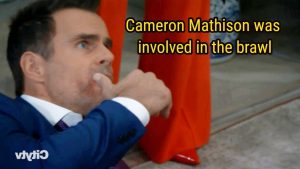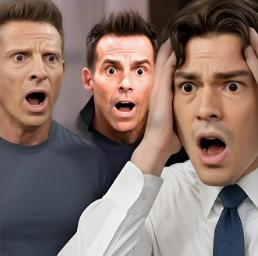The room held its breath the way a theater does just before the curtain rises on a moment that could redefine a legend and redraw the map of power in a beloved world. The air was thick with a charge that crackled louder than any dialogue; it pressed against the walls and pressed back into the chests of everyone who stood in its glow. In the center of this charged moment stood Cameron, not just a performer but a figure who had become part of the very blood and breath of a show that millions felt like a second skin. He wasn’t merely delivering lines or performing stunts; he was part of a living history in motion, a hinge on which the door to the future might swing or slam shut.

Across from him, the room carried the weight of consequences—unspoken, almost tangible. The incident that sparked the upheaval wasn’t a rumor, a misread cue, or a petty flare-up; it was a rupture, a blow that sent tremors through the foundations of a long-running, much-loved institution. The kind of event that doesn’t just mark the end of a moment but reverberates through careers, reputations, and the loyalties of an audience that wants its stars to be larger-than-life but never so flawed as to dishonor the stage they inhabit.
The legends in the room—the old-guard veterans who had weathered storms and scandals alike, the younger team hungry for a shot at a legacy—looked on with a mix of awe, fear, and the instinct to preserve something precious. Drew, a name that carried weight and history within the walls, stood as a counterbalance to Cameron’s flame. In such rooms, the balance of power isn’t written on a whiteboard; it’s etched into the faces that reveal more than words ever could: the lines that say, “We’ve seen enough,” and the eyes that say, “We’ve seen more than enough to know what’s next.”
What followed was not a simple punishment or a countdown to a disciplinary decision. It was a reckoning, a moment when the machine of a storied enterprise paused to answer a simple but brutal question: what happens when the story you tell becomes entangled with something you cannot redeem with apologies alone? The brawl, whatever its spark—whether a burst of ego, a collision of tempers, or a clash born of long-simmering tensions—unloaded a cascade of repercussions. The studio watched as a ripple turned into a tidal wave, threatening to wash away not just a single actor but the carefully choreographed ecosystem that kept a beloved character alive in the hearts of fans.
As the dust settled, the conversation began to crystallize around the invisible architecture of control. Who would rehearse the next scene in this evolving narrative? Who would carry the weight of public perception, of executive decisions, of the delicate ballet between keeping a beloved show authentic and protecting the people who keep it on the air? The answers were not simple, nor were they gentle. They demanded a kind of candor that’s rare in rooms where careers are made and remade by the click of a shutter, the roll of a camera, and the feverish devotion of a fandom that treats actors as family.

In the wake of action came a cascade of strategy. The studio weighed the optics of firing versus suspending, of recasting versus regrouping, of making a painful example versus choosing mercy with boundaries. Each option carried its own constellation of consequences: public sympathy suiting one path, logistical chaos another; fan devotion skewing toward outrage or toward forgiveness depending on the narrative the network chose to tell in its own defense. It was, in essence, a microcosm of every dramatic decision real life demands when the cameras stop rolling but the cameras of public scrutiny stay lit brighter than ever.
Cameron’s name did not vanish from the conversation; it hung in the air like a question mark that refused to resolve. Was this the end of his chapter, or a forced pause, a hard reset that would, with time, soften the edges of the story? The reports and whispers circled, carrying headlines that promised both a reckoning and a rumor of revival—the kind of duality that fuels a culture addicted to headlines and hungry for moments that redefine reputations in the space between a headline and a real, human consequence.
And then there was the silhouette of Drew, once a familiar light in the show’s gallery of characters, stepping into the gap with a gravity that suggested more than just a replacement. The decision to recast, to reallocate, to restructure the family of the show’s cast, wasn’t a mere logistical maneuver; it was a statement about resilience and the stubborn, stubborn will to keep telling the story they’ve promised to the